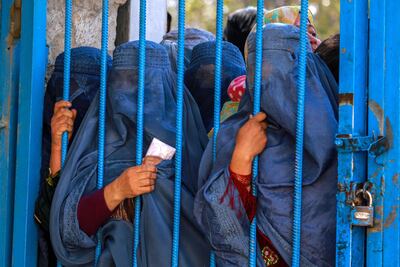Families of victims who died in the September 11, 2001 attacks are hoping to draw from the $10 billion in frozen Afghan reserves as payment in damages from court cases they won years ago.
Should the plaintiffs succeed, they could take more than three quarters of the frozen central bank reserves as Afghanistan deals with a cash crunch and the humanitarian crisis that followed the Taliban takeover after the US withdrawal.
The Afghan Foreign Affairs Minister, Amir Khan Muttaqi, on Monday urged US President Joe Biden's administration to release the $10bn in reserves that Washington froze after the Taliban’s return to power, AP reported.
“If the Biden administration recognises the Taliban, then the reserves would belong to the Taliban and lawsuits against the Taliban would recover money,” Scott Worden, director for Afghanistan programmes at the US Institute of Peace, told The National.
“But if the Biden administration does not recognise the Taliban, and there’s no indication that they will soon, then it’s an open question about who the reserves belong to.
"If it is for the benefit of the Afghan people, then it is a question of whether the lawsuits would apply because it’s not really Taliban money.”
The Biden administration had been scheduled to brief a federal court on its position over the frozen reserves last month but was granted a delay until January 28 to allow the Justice Department to sort through myriad thorny legal and geopolitical issues.
Lawyers for the most high-profile September 11 case seeking a portion of the Afghan reserves had sought a shorter delay from the Justice Department, The New York Times reported this month.
That plaintiffs in that case – Havlish et al against bin Laden, et al – include Fiona Havlish, whose husband died when the World Trade Centre fell, and Ellen Saracini, whose husband flew one of the planes that was hijacked.
A federal court ruled in 2012 that the dozens of plaintiffs listed in the case should receive about $7bn in compensation for their losses after the defendants, including the Taliban and Al Qaeda, failed to show up in court.
“Together with the others in our case, we obtained an enforceable money judgment against the Taliban and now call on President Biden to ensure the funds we have attached go to us, and not the terrorists who played a role in taking the lives of our loved ones,” Ms Havlish and Ms Saracini last month told The New York Times.
Lawyers in the case are seeking to persuade the Biden administration to back their claim by promising to divert some of the frozen funds they seek to humanitarian aid for Afghanistan.

But the effect of taking such a massive piece of the frozen reserves could harm ordinary Afghans as the economic and humanitarian crises in the country continue to deteriorate.
“The issue of the Afghan Central Bank’s reserves, which are frozen in the US and Europe, is a complicated one because the reserves were built up by the previous republic,” Mr Worden said.
“It was organised by the Biden administration and it was for the benefit of the Afghan people.”
The freeze in federal reserves has prompted Afghan banks to limit withdrawals, further compounding the cash crisis and driving up the cost of food and consumer goods.
“The Afghan people are facing multiple crises that are combining into one,” Mr Worden said. “First, they can’t get cash because of sanctions to either pay salaries or buy food.”
“We have suspensions of all donor funding, which supported 75 per cent of the Afghanistan national budget, so the government can’t provide services without that money.
"And then third, there’s been a drought this year and both the economy and people’s food supply is dependent on domestic agriculture.”
A low or non-existent level of reserves also curtails the Taliban’s future options to address these issues by reducing its ability to withdraw loans from organisations such as the International Monetary Fund.
“Even if the central bank reserves are released, they are usually not used just to pay for bills,” Mr Worden said.
“They help stabilise the currency. They also as security for international loans, including by the IMF.”
But the torrent of plaintiffs seeking to use the frozen reserves to settle unpaid damages continues as lawyers use the Justice Department delay to prepare their cases.
These cases include Ashton et al against Al Qaeda et al, and Thomas Burnett Sr et al against Al Baraka Banking and Investment et al.
Plaintiffs in the latter case have sued nearly 200 people and entities for allegedly supporting Al Qaeda in the lead-up to the September 11 attacks.
A fourth case, the estate of John P O'Neill Sr et al against the Republic of Iraq et al does not even name the Taliban as a defendant.
That case was filed mere months after the US invaded Iraq in 2003, paving the way for Al Qaeda to establish a foothold in the country.

